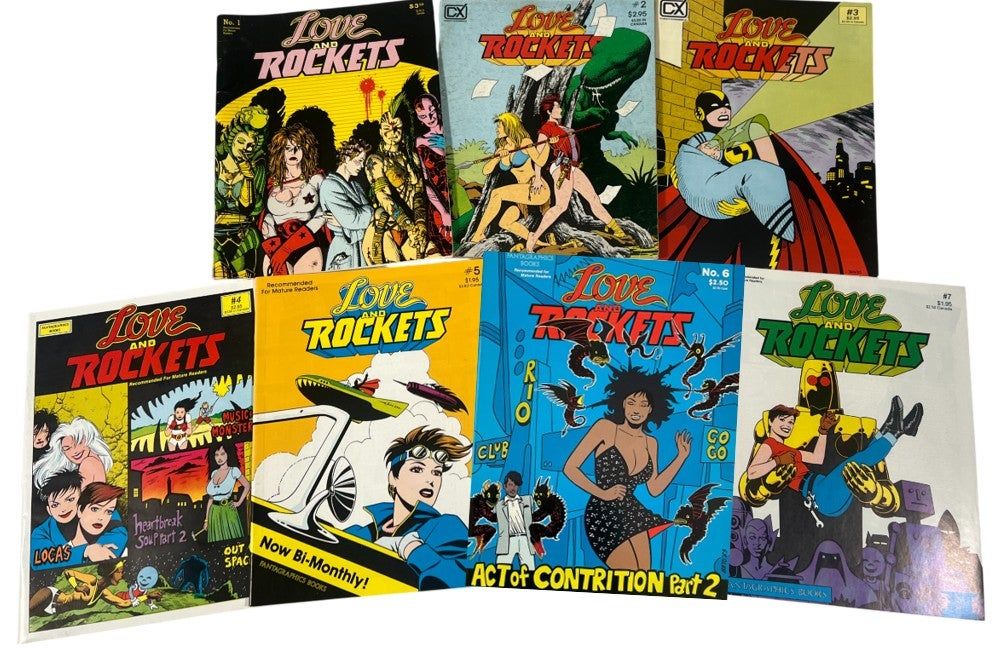Queer POC Alternative Latino Chicano Comic Series, Love and Rockets, Complete Run of First 7 Issues
- SIGNED
[Latino] [LGBTQ] [Comics] Hernández, Gilbert, Jaime, and Mario. Love and Rockets Nos. 1–7. Los Angeles and Seattle: Fantagraphics Books, 1982–1984. All first printings except No. 1, which is a second printing.
Complete early run of the first seven issues of Love and Rockets, the revolutionary independent comic series by the Hernández brothers that redefined the medium through Chicano, queer, and feminist storytelling. Originally self-published as a photocopied zine in 1981 before being picked up by Fantagraphics in 1982, Love and Rockets became the flagship title of the American alternative comics movement. These first issues introduced the dual narrative worlds that would come to define the series: Gilbert Hernández’s “Palomar,” a Latin American village saga infused with magic realism and social critique, and Jaime Hernández’s “Locas,” following two young Chicanas, Maggie and Hopey, through the punk, queer, and working-class subcultures of Southern California. The series broke from the male-dominated superhero norm, centering Latina and LGBTQ identities with unprecedented emotional realism and political awareness.
Archive includes:
[1] Love and Rockets No. 1. Fantagraphics Books, 1982. Second printing. The debut issue that launched the series, combining science fiction, punk energy, and surrealism. Introduces Maggie the Mechanic, Penny Century, and the postmodern adventure framework that evolves into Jaime’s “Locas.”
[2] Love and Rockets No. 2. Fantagraphics Books, 1983. First printing. Marks the true beginning of Gilbert’s Heartbreak Soup cycle, introducing the fictional town of Palomar and its ensemble cast of complex, working-class Latin American characters.
[3] Love and Rockets No. 3. Fantagraphics Books, 1983. First printing. Deepens the Locas universe with Jaime’s “Mechan-X” and “Tear It Up, Terry Downe,” blending Chicana identity, sexuality, and punk rebellion. Gilbert continues Heartbreak Soup with themes of community, myth, and motherhood.
[4] Love and Rockets No. 4. Fantagraphics Books, 1984. First printing. Features “Out O’ Space” and “Music for Monsters,” advancing Jaime’s Locas narrative and introducing more grounded, interpersonal realism. Gilbert’s Heartbreak Soup chapters explore memory and generational trauma through the character of Luba.
[5] Love and Rockets No. 5. Fantagraphics Books, 1984. First printing. Includes “Act of Contrition,” one of Jaime’s seminal stories portraying Maggie’s relationships and the emotional cost of self-discovery. Gilbert’s Palomar segments incorporate magical realism to probe love, death, and rural mysticism.
[6] Love and Rockets No. 6. Fantagraphics Books, 1984. First printing. Continues the Locas and Palomar arcs with greater maturity and narrative complexity. Features the Go-Go Club cover and deepens Gilbert’s political undertones through depictions of violence and desire.
[7] Love and Rockets No. 7. Fantagraphics Books, 1984. First printing. Concludes the earliest Fantagraphics sequence, synthesizing Jaime’s punk-era gender politics and Gilbert’s cross-generational Latin American storytelling. Establishes the tone of sociocultural depth that would define the decades-long series.
Light edge wear, faint creases, and minimal rubbing to covers; else clean. Overall very good condition. An exceptional early run of Love and Rockets in its formative years, an essential artifact of Chicano, queer, and alternative comics history that permanently shifted the American graphic narrative landscape.
Complete early run of the first seven issues of Love and Rockets, the revolutionary independent comic series by the Hernández brothers that redefined the medium through Chicano, queer, and feminist storytelling. Originally self-published as a photocopied zine in 1981 before being picked up by Fantagraphics in 1982, Love and Rockets became the flagship title of the American alternative comics movement. These first issues introduced the dual narrative worlds that would come to define the series: Gilbert Hernández’s “Palomar,” a Latin American village saga infused with magic realism and social critique, and Jaime Hernández’s “Locas,” following two young Chicanas, Maggie and Hopey, through the punk, queer, and working-class subcultures of Southern California. The series broke from the male-dominated superhero norm, centering Latina and LGBTQ identities with unprecedented emotional realism and political awareness.
Archive includes:
[1] Love and Rockets No. 1. Fantagraphics Books, 1982. Second printing. The debut issue that launched the series, combining science fiction, punk energy, and surrealism. Introduces Maggie the Mechanic, Penny Century, and the postmodern adventure framework that evolves into Jaime’s “Locas.”
[2] Love and Rockets No. 2. Fantagraphics Books, 1983. First printing. Marks the true beginning of Gilbert’s Heartbreak Soup cycle, introducing the fictional town of Palomar and its ensemble cast of complex, working-class Latin American characters.
[3] Love and Rockets No. 3. Fantagraphics Books, 1983. First printing. Deepens the Locas universe with Jaime’s “Mechan-X” and “Tear It Up, Terry Downe,” blending Chicana identity, sexuality, and punk rebellion. Gilbert continues Heartbreak Soup with themes of community, myth, and motherhood.
[4] Love and Rockets No. 4. Fantagraphics Books, 1984. First printing. Features “Out O’ Space” and “Music for Monsters,” advancing Jaime’s Locas narrative and introducing more grounded, interpersonal realism. Gilbert’s Heartbreak Soup chapters explore memory and generational trauma through the character of Luba.
[5] Love and Rockets No. 5. Fantagraphics Books, 1984. First printing. Includes “Act of Contrition,” one of Jaime’s seminal stories portraying Maggie’s relationships and the emotional cost of self-discovery. Gilbert’s Palomar segments incorporate magical realism to probe love, death, and rural mysticism.
[6] Love and Rockets No. 6. Fantagraphics Books, 1984. First printing. Continues the Locas and Palomar arcs with greater maturity and narrative complexity. Features the Go-Go Club cover and deepens Gilbert’s political undertones through depictions of violence and desire.
[7] Love and Rockets No. 7. Fantagraphics Books, 1984. First printing. Concludes the earliest Fantagraphics sequence, synthesizing Jaime’s punk-era gender politics and Gilbert’s cross-generational Latin American storytelling. Establishes the tone of sociocultural depth that would define the decades-long series.
Light edge wear, faint creases, and minimal rubbing to covers; else clean. Overall very good condition. An exceptional early run of Love and Rockets in its formative years, an essential artifact of Chicano, queer, and alternative comics history that permanently shifted the American graphic narrative landscape.


